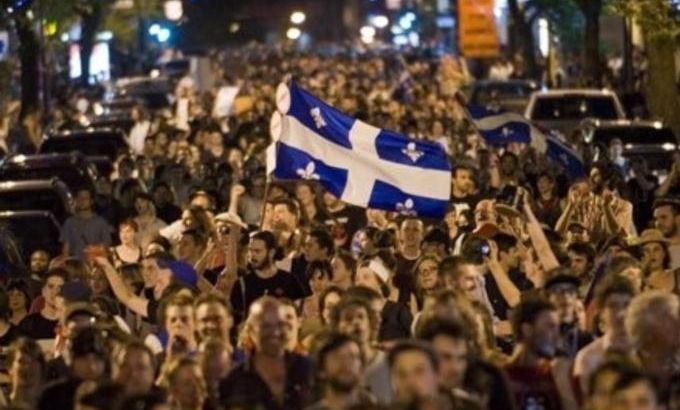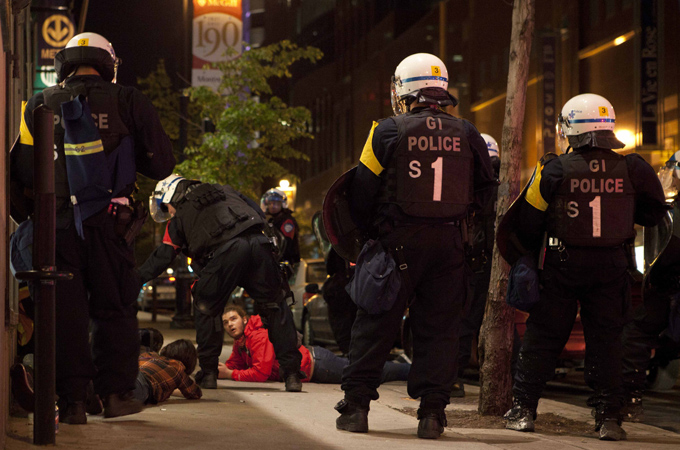Quebec: Time to queue up for polls
Tight three-way race on the cards as Canadian province votes on Tuesday following months of student unrest.

Montreal, Canada – An election in Canada’s largely French-speaking province of Quebec on Tuesday could deepen political uncertainty with none of the three main parties likely to get a decisive mandate.
The election was called a month ago by Premier Jean Charest, whose Liberal Party government has come under fire for plans to raise university tuition fees, as well as growing allegations of corruption.
His main opponent, Pauline Marois of the pro-independence Parti Quebecois (PQ), has been leading opinion polls, but only slightly with about a third of voters backing her.
A side story of the campaign has been the meteoric rise of the Coalition Avenir Quebec (CAQ), led by former PQ stalwart Francois Legault. A successful businessman, Legault has promised if elected to put the eternally unsettled question of Quebec’s independence on hold for at least a decade, and sort out the province’s shaky finances in the meantime.
Students challenge politicians
The months leading up to Charest’s election call were marked by recurring and occasionally violent student protests over his government’s plans to raise fees by 80 per cent for post-secondary education.
Quebec students already pay the lowest tuition in Canada, and the increase would have left that distinction intact. But the province has a long history of social agitation and the right to cheap education is a powerful allure for young and progressive Quebeckers, who took to the streets in their tens-of-thousands.
|
The Partis Quebecois is an iconic force in Quebec that has long campaigned for independence from Canada. |
Charest tried to face the protesters down, then rushed a new law through the National Assembly that limited the right to demonstrate, and imposed severe penalties on violators. Though the public seemed weary of the nightly rallies in Montreal and other cities, the harsh new emergency law proved more of a catalyst as lawyers, trade-unionists, environmentalists and others soon joined the students on the streets.
At the same time, growing allegations that tied Charest’s government to corruption in granting public contracts has led to a judicial inquiry that seems almost certain to lead to embarrassing revelations.
Yet despite the growing unpopularity of his thrice-elected government, his main opponent Marois has seemed unable to make substantial gains.
Independence party struggles with identity
The PQ is an iconic force in Quebec that has long campaigned for independence from Canada. It has held two referendums asking Quebeckers to approve a split with Canada. It lost on both occasions, but the second only by a narrow margin of less than one per cent.
Marois has said she’s in no hurry to call a third referendum, should she win Tuesday’s vote. But in what is seen as an acknowledgement to the party’s pro-independence base, she said she intends to press the Canadian government to transfer more power to Quebec. If that fails, Marois could use Ottawa’s refusal as a basis to push again for a vote on independence at some future date.
The debate over independence has always been emotional and potentially costly for Quebec. Montreal was once Canada’s business capital, but the PQ’s landmark election victory in 1976 sent many of the country’s top companies to Toronto. The economy has recovered and changed since then, but many businesses remain wary of investing at times of political uncertainty.
While the idea of independence remains popular with many Quebec voters, an actual mandate to split with Canada – with all the attendant costs and uncertainties – still remains difficult, if not impossible, to win.
 |
| Quebec police arrest protesting students [Mimi Wells/Al Jazeera] |
Marois has also said she will restrict access to English-language education, and plans more rigorous enforcement of Quebec’s already-strict laws favouring the French language.
More alarmingly for those Quebeckers whose mother tongue is neither French nor English, she has promised to bring in a “Charter of Secularism” that – among other things – restricts civil servants from wearing overt religious symbols such as Muslim hijabs, or Sikh turbans.
Quebec has long seen itself as a religiously neutral society, somewhat like France, and has been debating the issue of religious symbols in public life for years.
A secularism law, such as Marois promises, might be against Canada’s constitutional guarantees of Freedom of Religion, and could be struck down by Canadian courts.
New party rises
Then there is the CAQ, Quebec’s newest political party, which seems to have garnered the support of Liberals tired of the current government, and more than a few disaffected pro-independence voters. Leader Francois Legault does not have the most coherent set of policies, but he has promised to fight corruption and has attracted star candidates from business, the police and elsewhere.
The CAQ has surged from nowhere to a tightly contested second place in pre-vote polls, and a few of the province’s staunchly pro-Canada newspapers are somewhat reluctantly endorsing Legault in their editorial columns.
Still, his prospects at the ballot box remain uncertain, say opinion pollsters, because it is harder to identify committed voters for a party that has not run for office before.
Many other issues abound, not least Quebec’s heavy indebtedness, and its somewhat worrisome fiscal situation. Taxes are already among the country’s highest, and many Quebeckers expect health care and other government services to improve, not be restricted in the name of austerity.
No matter who wins Tuesday’s vote, tough decisions lie ahead. It is hard to find anyone beyond partisan politicos who truly believes any possible outcomes at the polls will mean immediate improvements for the people of Quebec.